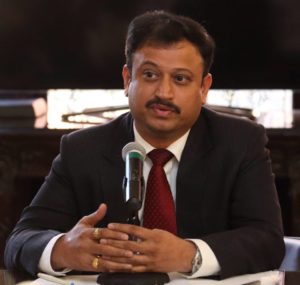 Nilkanth Avhad’s presentation of the political and business environment was a little more optomistic than Sumona Guha’s. Avhad is an Economic Counselor for the Embassy of India and said much of the same things as did Guha but with a more positive spin.
Nilkanth Avhad’s presentation of the political and business environment was a little more optomistic than Sumona Guha’s. Avhad is an Economic Counselor for the Embassy of India and said much of the same things as did Guha but with a more positive spin.
Nilkanth Avhad emphasized India’s growth explaining that the country was opened economically from socialism in 1991. Since then, the government has been pursuing a policy of economic and social improvement simultaneously. He underlined that India’s economy has been growing at a near-constant 7% over the past several years and is expected to continue at around 7% in the foreseeable future while China’s growth is expected to slow. He also explains that while Indian subsidiaries of foreign companies have consistently been growing over the last couple of years, the parent companies have typically experienced declines. I would argue that there is currently a lot of new potential in India’s untapped market which makes growth easier as opposed to growth in mature markets. Nonetheless, India has other challenges that mature markets do not have to face so this growth of Indian subsidiaries is in fact very impressive. Moreover, Avhad noted the “Make in India”, the Goods and Services Tax and the increased position on the World Banks’s Ease of Doing Business Report as examples of how the government has taken steps to improve the economy. What I found particularly interesting about his talk were some of the goals and promises that Prime Minister Modi has made: forty kilometers of roads to be built each day, 250 new airports to be built and R&D hubs to be fostered.
While he seemed to be a bit too optimistic about the success of India’s economy, Avhad highlighted some very interesting indicators that pertain to the growth of the Indian economy.